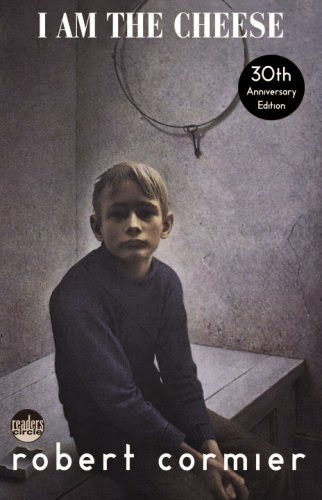Looks like I picked the wrong decade to start reading
Unintentionally, it's 1970's week and/or month. I've been reading novels from that decade and I don't know why. Some are YA and will be reviewed here, while others are destined for my new blog entitled, Dear 1970's, You're Weird & Gross (Don't Ever Change)."
[Cue flashback sequence]
1996: I'm in Spanish I with Señor Patterson. First of all, his name is Señor Patterson, so how can I take him seriously? Second, he looks and acts like the Dean on Community, a TV show which does not exist in 1996, so I've just committed an act of anachronism. Pardon me for not being able to think of something more period-appropriate, as I spent most of my teenage years in the basement.
Sr. Patterson: Let's review our infinitives. Responde en íngles. Antonio, enseñar.
Antonio: To be insane?
Sr. Patterson: Paco, correr.
Paco: The thing you slice apples with?
Sr. Patterson: Samuel, ir.
Samuel: I thought we were doing verbs, not anatomy.
Sr. Patterson: Samuel, I'll see you in detention today.
Samuel: Merde.
[End flashback]
Surprise! I was Samuel. Spanish class was torture to me, yet I went on to minor in the language in college, then promptly lose most of it because I had no one to practicar with me, and it made me muy triste.
GET ON WITH IT
 |
| It's a metaphor. |
I suppose this book is a classic; if it receives a 30th Anniversary edition, it's not a hunk of stale mozzarella. In fact, it's a gouda one, and probably made Robert Cormier lots of cheddar. Dairy I continue with these puns? No.
Cormier has three simultaneous narratives going, which breaks up monotony and ought to intrigue the reader as to how they will come together. And they do! What's most impressive is the presentation: One is a first-person narrative of the protagonist, Adam Farmer, on a desperate bike ride* to see his father, the second is his life told in flashback, and the third is a transcript of Adam talking to what we believe to be a psychologist. What I thought would be an obtuse teen drama turned out to be a crime thriller of sorts. Not my normal reading material, but worth the time. In an interview with the author published in the 30th anniversary edition, Cormier states that he was worried that the fractured narratives would alienate his audience, but the presentation is so vivid and compelling that he achieves the desired effect. Cormier gradually introduces hidden elements of the story, as a practiced writer does, rather than throwing everything at you in the last five pages (every story ever written by a 7th grader).
Adam himself is complex, aloof, and somewhat strange, but he resonates. Who hasn't eavesdropped on their parents' phone calls, thinking that they were up to something, or pressed themselves against the wall around the corner to listen in on their quiet conversations. I did, and that's how I learned that the goldfish hadn't actually gone on vacation, and what really happened to the dog. [I had told my little sister that the dog ran away to join the circus; she still hasn't forgiven me.] Because each of the three narratives centers on Adam in a different context and condition, we know there is something underneath that he/we want to discover, and that makes for great anticipation of what will happen next. Even after the big reveal, there's more to the story; Cormier doesn't know the definition of falling action. He breaks the rules!
 |
| The true face of literary rebellion. |
Here are some of the questions I generated while reading and trying to get to the bottom of the mystery:
- Why does Adam so badly need to see his father?
- What's the "present" he's bringing along?
- Why does this psychologist keep asking the same questions over and over?
- What's the deal with the title and - oh, I get it now.
And so on. It's difficult to explain much of the book without giving away details, but the above questions will get you started. If you like your stories spoon-fed to you, 1) what are you doing here? and 2) please view the 1983 film of the novel, which completely changes/destroys the ending, on the magic of the You Tubes, starring a young Cynthia Nixon, who would later be in a show many girlfriends have forced me to suffer through. At least it's not in Spanish.
*Another bike ride story, another mystery, another set of interrogations, and another reason for me to be irritated with Jennifer Bradbury.
NEXT TIME, I YELL ABOUT
the second installment of 1970's week and/or month. This time, it's historical fiction, and it so moved someone to create an entire website built around the story. I'm far too lazy to do such a thing, as are the authors of the book; let's just say the TITLE GIVES IT ALL AWAY!
BORING STUFF
Robert Cormier
1977 Alfred A. Knopf
No comments:
Post a Comment